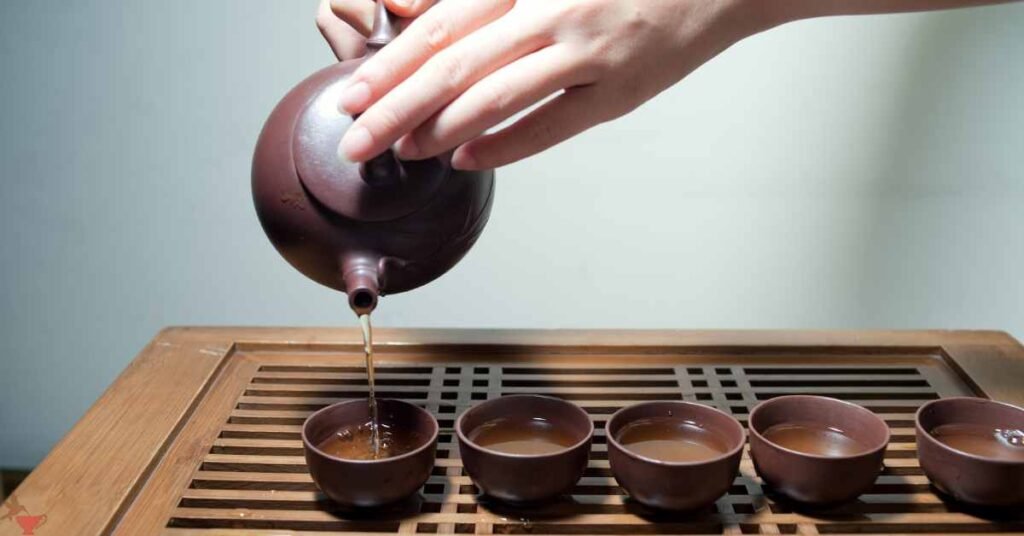Tea, the aromatic elixir cherished across cultures for centuries, has stirred endless debates and discussions, one of which revolves around its acidity.
The question of whether tea is acidic or not has puzzled tea aficionados and health enthusiasts alike.
While some assert its acidic nature, others argue for its alkalinity, creating a conundrum that warrants exploration.

Debunking the Acidity Myth
The perception that tea is acidic primarily stems from its taste.
Certain types of tea, particularly those made from leaves of the Camellia sinensis plant, possess a flavor profile that may come across as slightly acidic.
This taste is attributed to the presence of polyphenolic compounds, notably tannins, which impart a characteristic briskness to the brew.
However, the acidity of a substance is determined by its pH level, which quantifies the concentration of hydrogen ions present.
On the pH scale, values below 7 indicate acidity, while those above 7 signify alkalinity.
Remarkably, tea tends to hover around the neutral mark on this scale, with a pH ranging approximately between 6 and 7, depending on factors like brewing time, temperature, and tea type.
Understanding Tea’s pH Dynamics

The pH of tea varies according to several factors:
- Tea Type: Different types of tea exhibit varying pH levels. For instance, black tea, which undergoes extensive oxidation during processing, may have a slightly lower pH compared to less processed varieties like green or white tea. Herbal teas, on the other hand, crafted from a plethora of botanicals, can display a wide range of pH values depending on the ingredients used.
- Brewing Parameters: The pH of tea can also be influenced by brewing parameters such as water temperature and infusion time. Steeping tea for longer durations or using hotter water can potentially elevate its acidity due to increased extraction of tannins and other compounds.
- Additives: The addition of milk, lemon, or other flavorings can alter the pH of tea. While milk tends to neutralize acidity, lemon juice can impart a more acidic taste to the beverage.
Health Implications:
The perceived acidity of tea has prompted inquiries into its potential health effects.
Acidic beverages are often associated with adverse effects on dental health and gastrointestinal comfort.
However, the modest acidity of tea is unlikely to pose significant risks to most individuals.
In fact, tea offers an array of health benefits attributed to its rich antioxidant content, including catechins and flavonoids, which have been linked to reduced risk of chronic diseases such as heart disease and certain cancers.
Scientific studies indicate that tea consumption may actually have alkalizing effects on the body despite its acidic taste, owing to its mineral content and metabolic byproducts generated upon digestion.
Practical Considerations:

While the acidity of tea is a topic of interest for some, it holds limited practical significance for the majority of tea drinkers.
Enjoying tea in moderation as part of a balanced diet is unlikely to have adverse effects on health, regardless of its pH.
For those with specific concerns about acidity, opting for herbal infusions or lighter teas with lower tannin content may be preferable.
Additionally, adjusting brewing parameters and exploring tea additives can help tailor the acidity of the brew to individual preferences.
Final Word
The notion of tea being inherently acidic is a misconception perpetuated by its taste profile rather than its actual pH.
While tea may exhibit a slight acidity, it predominantly falls within the neutral range on the pH scale.
Furthermore, its modest acidity is outweighed by its numerous health benefits and cultural significance.
Instead of fixating on its pH, tea enthusiasts are encouraged to embrace the diverse flavors and aromas offered by different varieties of tea, appreciating the beverage for its rich heritage and potential contributions to well-being.

So, the next time you sip on a cup of tea, relish in its complexity, knowing that its acidity is just one facet of its multifaceted character.
MEDICAL DISCLAIMER
Itsnevernotteatime.com cannot and does not contain medical/health advice. The medical/health information is provided for general and educational purposes only and is not a substitute for professional advice.




